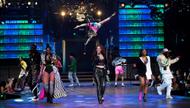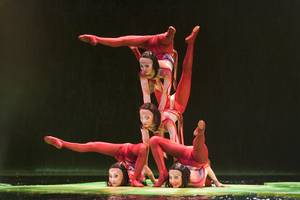If you’ve seen Cirque du Soleil’s Mystère or O sometime in the past 20 years, odds are good you heard Dina Emerson’s gorgeous, haunting mezzo-soprano voice soaring over the acrobatics. But her siren song reaches further than that. The endlessly versatile performer—who came to Las Vegas from Santa Barbara, by way of New York City—has done lots of Downtown work, too. She’s performed several shows with Majestic Repertory, including its recent genre-busting (and safely distanced) Majestic Drive-Thru Theatre series, and gave some of her magic to Vegas Theatre Company’s Men on Boats. At one key moment in that gender-flipped dark comedy, Emerson simply hummed an improvised tune—a character beat pulled directly from the script—and transported those raucous proceedings into the realm of the ethereal.
Currently homebound and, like too many of us, between paying gigs, Emerson talked to the Weekly about her “sandwich” of Cirque engagements, experimenting with her talents and why she’s sticking with Vegas.
How did you become a singer? Were you born with it? I would say no, I was not born with this voice. I was a theater person, an actor, and I had one of those crazy transformative experiences when I was a teenager, when I heard my high school choir do a concert in the old mission. We had a genius choir director who could get a sound out of these crazy teenagers that you just couldn’t even believe. And my whole life just went, whaaaat? I have to sing. And I worked really, really hard for many years trying to develop the ability to sing, and I didn’t have an easy time technically. … Very few people are born being able to do something technically amazing without practicing. But then, when you really get somewhere, it seems like you didn’t have to practice. It’s like this fantastic illusion.
So, yeah, I wasn’t a songbird from Day One, but I wanted to do it so much. And then I figured out what I liked to do vocally and what I was really good at, because I’m not good at everything. I’m a terrible pop singer, absolutely ghastly. But I’m good at opera, and I can sing what they call world music, fusion-y stuff—which was kind of perfect for the older Cirque shows.
It translated beautifully to that Old Shady moment in Men on Boats. Have you done any other local productions with which we may not be familiar? Well, until 2017, I was working full-time at Mystère, so I wasn’t really able to do much other work. But after I left in 2017 I worked with Vegas City Opera, which was called Sin City Opera at the time; and did Kurt Weill’s The Seven Deadly Sins, which was really great; that was a co-production with Cockroach Theatre. Then I did a play with A Public Fit, Small Mouth Sounds, and then two years ago I did Animal Farm with Troy [Heard] at Majestic. When I left Cirque, I really wanted to try and find like the acting part again, which I hadn’t done much of in 25 years. It’s been really wonderful to sort of squish those two things together again, like do some real straight acting and also hybrid [work].
Oh, yeah! I also did the Lab at Super Summer Theater; we did the concert version of A Midsummer Night’s Dream. Then, for a year, I was back at O until it shut down. So, I’m really grateful to be involved in things pretty regularly.
Who have been some of the biggest influences on your creativity? There are two avant-garde vocalists who completely made me who I am: Meredith Monk, who I worked with in New York, and Diamanda Galás. I don’t know if your readers will know those two, but I would say look them up. They’re the two pillars of my whole journey as a vocalist.
It’s funny. Once I moved out here, it was like another chapter, and a lot of people, at least at Cirque, don’t know about that world at all. And so many, many years went by where I didn’t really talk to anyone about avant-garde music. It’s been kind of nice to go back to those roots.
Who fires you up locally? I really love what Troy is doing at Majestic, what he’s doing with immersive theater—I’m super into that now. I love how he’s trying to pivot during this time and just figure out something that we can do that’s not Zoom (laughs). And I’m really excited by RADAR, what Brent [Holmes] and those guys have been doing. When RADAR was still happening live, I’d go all the time; it was so great. They could just do anything in real time. I’ve actually done some soundtracks for Brent recently; I’m getting into sound design now.
Is that how you’ve you kept yourself occupied during the pandemic? Yeah. I’ve always been a bit obsessed with how sound can tell a story—which is typical sound designer-speak—but I never actually learned how to use the equipment or the software very well. So now, I’ve been getting tutoring from somebody in Logic, and I’m learning how to actually put my ideas into an audio landscape. I have a plan to write a 30-minute show that’s like a 30-minute audio trip. You would put it on your phone or device, with your own earphones; then you would go to wherever the location is, which would be outside, and you could see the live elements [of the show] from far away. It’s kind of like a movie soundtrack, except that you’re going to see something live, but safely. I’m writing that now for the fall, when it’s cooler and we can go outside again (laughs).
What do you do to feed your creative impulse? I’m a huge reader, have been since I was a kid. My parents would get mad at me when I was little, because I would be reading instead of looking out the window on trips. So, in a weird way, the pandemic has been not the worst for me because I just have been reading up a storm. The problem with that is, things get too overly introverted, because in essence, everything I do is about live performance. We’ve been watching a lot of stuff because we can’t go to shows; before all this happened, if I wasn’t performing, then [my husband] Keith and I would go see a show. We would just go see something every night, you know?
But, yeah, these days I read and I definitely listen to music. I’ve been reading a lot of Black Lives Matter books, sociology. I’ve been in a study group for about eight weeks now, and it’s very, very important to me. And I just started this same book by Charlie Kaufman, the screenwriter; he wrote a novel called Antkind, and it’s absolutely crazy. It’s 750 pages long, and it’s like indescribably weird. I love a 750-page book; just bring it on. I love science fiction; the thing will probably have some kind of science fiction aspect, but I’m not quite sure what yet. But a Neal Stephenson book can be 900 pages and just be so great.
What are your favorite places to go to get inspired? The Arts District. And I really love “Seven Magic Mountains.” It’s kind of a perfect place … a perfect little abstract, magical Vegas simulacra. … And I like going hiking, but I don’t do it enough. But to get really inspired, I like to see people performing and creating stuff. That’s harder now, because we can’t do that. When we did the [Majestic] drive-thru project, it was like a bright light, being able to see a few people that I really care about and make something.
Do you have a treasured memory of your time with Cirque? In 2000, I got the job to replace the singer at O for six months. I had never been to Las Vegas. When I got here, it was 95 degrees and I didn’t know what the heck was going on. And the first thing that they do is give you a ticket to sit in a really good seat in the theater and watch the show. If you’ve ever seen O, you know that the beginning is spectacularly mind-blowing. I was sitting there watching that happen, and I thought, what have I gotten myself into? I had done a lot of work, but this was so extravagantly magical. I felt this overwhelming sense of wonder and happiness.
What kind of Las Vegas do you hope to see when this crisis has passed? What should we be doing now, to make a solid post-COVID future? Well, I don’t know if any help is going to come from our state government, but the local venues that have live performance need help so badly. Any kind of support, to get them through to whenever we can gather again. And I don’t know where it would come from, but what I would really like is to see more creative music happening here. That’s the one thing I feel is really missing, because there’s great bands, classical music and EDM or whatever, but what we don’t seem to have is artsy, weird music; people really just experimenting. … Perhaps when Meow Wolf gets going—that kind of hybrid stuff is what they’re known for.
But you still believe in Vegas; that hasn’t changed. Yes. When I first came to town 20 years ago, it was supposed to be for six months, and then it ended up being two years, and then 20 years. I never, ever thought that this would be where I would put roots, but I’m completely in love with Las Vegas now. I want to be a part of anything that makes this a great place to be.
The thing is, everyone’s kinda in the same boat… Everybody’s on pause. So what I’m hoping is that since everyone is so stuck, then that means that we’re all gonna come out together in a huge rush of creativity. That doesn’t address paying the bills until then, and I’m really sorry about that, but I’m hoping that because we are all in this together, that we will walk out of it together.








